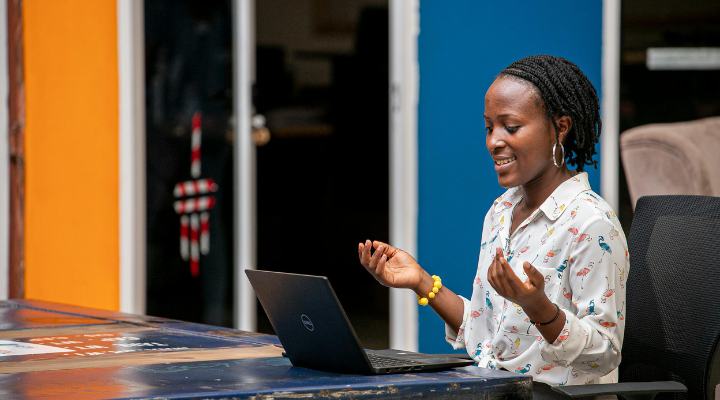Artificial intelligence is no longer just a buzzword in Africa; it’s reshaping industries, boosting productivity, and powering innovation to ensure Africa – with their skilled, AI specialist talent - is leading the charge in technological revolution, and transforming F100 companies across the world.
The continent has become a driving force behind innovation, delivering real, measurable impact across industries and borders. What once felt aspirational is now a part of everyday business operations as companies across Africa report impressive gains in both productivity and ROI, often surpassing global benchmarks. This progress is accelerated by a cohort of ambitious technologists, rapidly upskilling and winning roles with some of the biggest names in tech. Microsoft, Google, and Intel are all investing heavily in building Africa’s tech ecosystem and workforce. From Senegal's cutting-edge data centers to Cassava Technologies’ announcement to establish Africa's first AI factory powered by NVIDIA, African entrepreneurs are no longer just participating in the global tech economy, they’re leading it.
A recent report by the Tony Blair Institute for Global Change, “Governing in the Age of AI: Unlocking a New Era of Transformation in Africa,” highlights AI’s potential to drive governance, economic growth, and public-sector innovation across the continent. Africa is positioning itself as a global leader in applied AI innovation by creating real-world business results in sectors like banking and agriculture, backed by investments from tech giants and local innovators.
But what does this surge in AI adoption look like on the ground? And how are African organizations turning AI investments into real-world ROI?
AI adoption, training, and ROI are all gaining momentum in Africa
Fifty-six percent of companies in Sub-Saharan Africa (SSA) say AI has boosted employee productivity, a figure that’s “comparable to or exceeding global benchmarks,” according to the latest research by PwC.
Upskilling technology talent is at the heart of this increase. With more than 716,000 professional developers in Africa - around 80% of whom are under 35 - tech innovators across the continent realise the importance of equipping technologists with cutting-edge technical skills to drive business value and create long-term sustainability in AI-powered innovation across industries.
The PWC study also shows firms in that region of Africa are extracting real business value from artificial intelligence. Although SSA’s AI adoption rate (75%) slightly lags behind the global rate (83%), one-third of companies in Sub-Saharan Africa have already seen returns on their AI investment within the past 12 months:
- 33% report revenue gains from AI adoption
- 32% say AI has led to increased profitability
Those ROI figures are on par with data coming out of the US. In a recent survey commissioned by GenAI platform Writer, a third of American companies say they’ve attained “significant return on investment” from their AI activities.
Circling back to the PwC study, it suggests AI adoption in Sub-Saharan Africa goes deeper than the window dressing efforts of merely using a few apps:
- 22% of firms in SSA have significant plans for AI adoption in their core business strategy
- 23% expect large-scale AI integration in their organization within the next three years
- 9% expect very large-scale integration requiring workforce development
Looking ahead, companies in SSA remain optimistic about the future impact of AI on their organizations, and they’re committed to continuing or increasing their investment in the technology. Within the next 12 months, 45% expect AI to increase profitability at their businesses and 75% plan to adopt or expand their AI initiatives.
From Fintech to Agritech: Agentic AI accelerates ROI
A study on Morocco’s three largest banks sheds further light on the kind of real-world ROI gains AI is enabling on the African continent.
According to research data from 150 bank branches across Morocco, branches with a high level of AI adoption recorded 15% higher monthly revenue than those with a lower adoption rate. Branches that used AI to automate more than 10 processes saw customer satisfaction rise by a hefty 20%.
Overall, AI cut operational processing times by 30% and increased monthly new account openings by an average of 2.5%. There was a correlation between AI investment and productivity: bank branches that spent more than 15% of their budget on AI saw productivity rise by an average of 18%.
Fintech isn’t the only industry vertical where the ROI of AI adoption is being demonstrated in Africa. In healthcare, the Elton John AIDS Foundation uses AI-enabled drones to deliver lifesaving medical supplies faster and more cost-efficiently to patients in Nigeria.
Cattle farmers in Namibia use AI-enabled systems to optimize feeding schedules, detect grazing pattern anomalies, and spot signs of disease in their herds, thereby reducing feed costs and livestock losses. And freight companies in 14 African countries are tapping into a local Ghanaian startup’s AI logistics platform to boost profits and speed up crossborder shipping times.
Safaricom leverages Agentic AI to build meaningful connections
African telecom giant Safaricom deploys it’s interactive chatbot, Zuri, to handle thousands of customer queries per day, improving customer experience and freeing up time for human customer service reps to solve more complex issues. “We serve over 40 million customers,” comments Andrew Masila, Head of Innovation at Safaricom. “That’s a lot of data, so AI gives us the capability to generate personal recommendations for customers.”
Meanwhile, agritech start-up Twiga Foods has collaborated with IBM Research Africa to develop supply chain optimization agents that autonomously negotiate prices between farmers and retailers. These agents use reinforcement learning algorithms to maximize value for both parties while reducing food waste.
Africa-based organizations including Data Science Nigeria have accelerated this adoption by developing curriculums for technologists to equip them with skills in building and deploying AI agents that can navigate complex environments and make decisions with minimal human supervision. These practical applications are driving demand for local talent who understand both the technical aspects of agentic AI and the unique contextual challenges of implementing these technologies in African markets.
Upskilling at scale — Microsoft and Google invest in tomorrow’s innovators
AI is evolving so quickly that companies run the risk of their employees’ AI skills becoming obsolete overnight. That’s why Africa’s public and private sector players are investing in upskilling to support the continent’s growing AI workforce.
Google unveiled its own $5.8-million plan last October to fund programs in Sub-Saharan Africa. The money will go toward AI upskilling for workers, public policymakers, and non-profit leaders, plus AI safety and ethics education for teens. “Africa stands to accelerate its growth through AI as more people gain connectivity and harness technology for good,” said Matt Brittin, Google’s President of Business and Operations in Europe, Middle East, and Africa. “Across the continent, a new generation of innovators is harnessing technology to solve some of the world’s most pressing challenges, and to build a brighter future for themselves and their communities.”
In January, Microsoft announced a plan to provide AI and cybersecurity training for one million people in South Africa by 2026. Microsoft committed an undisclosed amount of money to the program, which will train South Africans from various sectors including government, youth, and private companies. Also in January, Intel teamed up with Nigeria’s government to launch a free AI youth academy. The academy offers free, self-paced courses on AI fundamentals, tools, ethics, and practical applications. As a bonus, students in the academy can compete for positions at Intel as AI interns and AI youth ambassadors.
And in May, Andela founded the AI Academy, a learning scheme for technologists within the Andela Talent Network, across Africa and the rest of the world, to upskill in the latest AI tools. The AI Academy recently launched with it’s first eight-week GitHub Copilot certification program. The response has been overwhelmingly positive, with six enterprise clients stepping forward to enroll 80% of their Andela developers in the program's 200-person pilot, signaling a decisive commitment to building AI-driven capabilities.
Africa’s Talent are leading the AI revolution
Continuous upskilling will help African companies stay competitive in the global AI race; so will the continent’s youthful, educated, tech savvy population.
Andela’s recent market update report, Africa’s Untapped Tech Talent Pool, found that:
- Africa has one of the world’s youngest and fastest growing populations.
- The youth literacy rate climbed from 63% to 80% between 1985 and 2023.
- Enrolment in post-secondary education more than doubled from 2011 to 2021.
- The number of professional software developers hit 716,000 in 2021, a 3.8% jump in just one year.
- The average software developer working for an international firm in Africa has six years of experience.
African companies are not only adopting AI, they’re finding ways to gain real business value from AI today, while making sure Africa’s next generation of innovators has the right skills to build AI for tomorrow.
Unleash AI Growth with Africa’s Tech Talent
Discover how Africa’s untapped tech talent pool can power your AI-driven growth. Read our market update report, "Africa's Untapped Tech Talent Pool", and learn how to harness the innovation and expertise of world-class professionals.




.avif)



.png)










